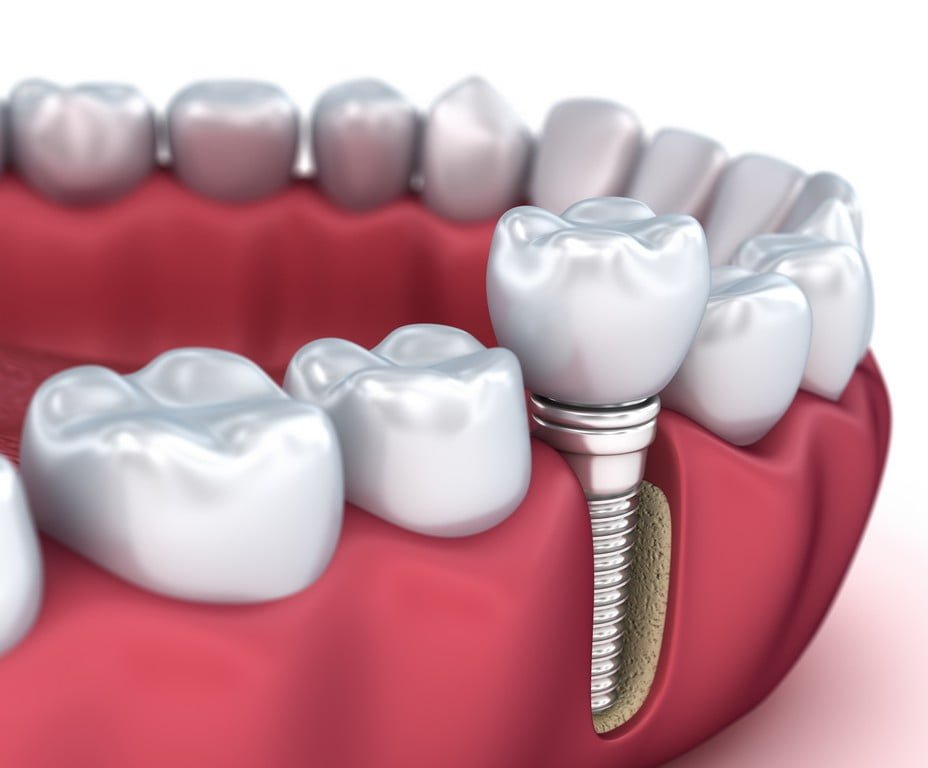DENTAL IMPLANTS
A dental implant is a small screw-like post that is inserted into the jawbone to replace a natural tooth. The implant acts like a tooth root and grows together with the natural bone over time. This is how the implant maintains its stability. Dental implants are suitable for patients who are looking for a permanent, fixed tooth replacement. The implant has the advantage that it looks completely natural and also adapts naturally to the jaw.
Normally, the implant is placed in the jawbone, then heals and grows together with the rest of the bone. This healing phase can take 6 weeks to 6 months. During this time, the treated area must be spared. This allows the implant to heal without pressure being exerted on it during chewing. It also reduces the risk of implant failure. After the implant is firmly attached, the dentist will make an impression of the mouth in order to fabricate a crown, which will be placed on top of the implant and on the post (connector). The time between placing the implant and attaching the final prosthesis varies depending on the patient, as it depends on the density of the jawbone and other variables.
A dental implant can be used to hold a single tooth in place, but it can also be a part of an entire denture. In options such as All-on-4 or other implant-supported dental bridges and implant-supported overdentures, some strategically placed dental implants are used to hold an entire arch of teeth (up to 10 or 12 teeth).
Who Are Dental Implants Suitable For?
Dental implants are suitable as a natural tooth replacement for patients where single or multiple teeth could not be retained.
Treatment is not recommended for pregnant women, patients with impaired immune systems, diabetics, heavy smokers, patients who have recently suffered a heart attack or undergone radiation therapy, in cases of bruxism (teeth grinding) or a receded jawbone.
Time Required
The average length of stay in Turkey is about 1 to 2 days. Usually, patients have to visit twice at an interval of 2 to 6 months. The first stay usually lasts 1 day. The second stay may be longer depending on the fabrication time of the crown(s) or bridge(s).
Before The Dental Implant
Prior to establishing a treatment plan, it is especially important to perform a thorough evaluation. For this reason, patients are asked to send dental x-rays to the dentist planning the treatment. The treating dentist can take such X-rays on site or already have them available. This is the only way the dentist can determine whether bone grafting is necessary and how long the treatment will take overall.
A small bone graft can be done at the same time as the implant is placed, more complex bone grafts require a certain healing time.
The success of dental implants depends on many factors, including the position in the jaw and the thickness of the bone. Patients should ask their dentist about the likelihood of complications.
How Is The Treatment Carried Out?
Usually, implants are made of titanium, but alternatively, there are zirconium implants, which have a particularly natural appearance in the result and are therefore well suited for crowns in the visible front area.
To place a dental implant, the dentist must first remove the gum tissue. Sometimes an incision is made on the top and the gum is pulled back to expose the bone. Some dentists, on the other hand, prefer to cut out a small piece of the gum to fit the implant.
The dentist will then use a series of different drills to drill a hole in the jawbone and enlarge that hole. After the hole is the right size, the implant is rotated firmly into place. Usually, the dentist will place a temporary cover at this point instead of the crown to allow the area to heal in a protected manner. This cover consists of a cap that is placed on the dental implant and serves as a placeholder to prevent the gums from growing over the implant. The gum is closed around the cover and sutured if necessary. After the implant has fused with the bone, the final cover and crown are attached.
After The Dental Implant
After the surgical procedure, you should refrain from eating solid foods and smoking during the healing phase. Swelling, bruising, pain or slight bleeding may occur.
Possible Risks
Possible risks include infection, failure of the prosthesis to anchor to the bone, nerve damage, damage to surrounding teeth, sinus damage, loss of jaw bone.
Cost Of Dental Implants In Istanbul
In our clinic in Istanbul, the price of a dental implant starts at 250 euros. The final cost is then calculated based on the price of the material used, the number of implants, the type of anesthesia or sedation and the other treatments that will be performed along with the placement of the implants.
Send us your request and our Care Team will contact you immediately for a consultation to find the most suitable treatments for you and to put you in contact with our doctors.



































